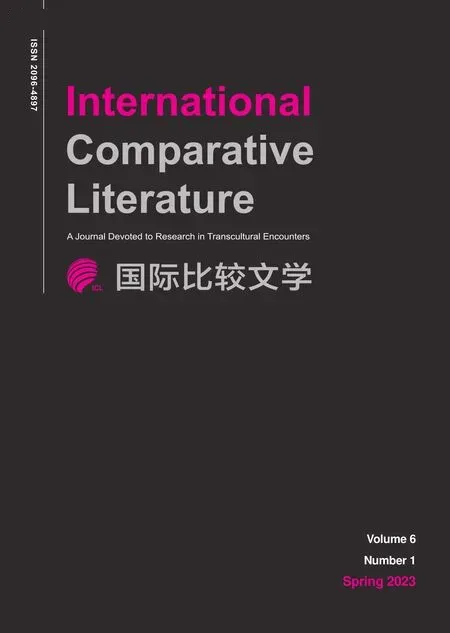ZHANG Longxi.A History of Chinese Literature.
One of the fairest ways to critique a history of Chinese literature is to judge whether the author or editor is trying to achieve his goal in a way he considers efficient and acceptable to readers.In this sense,Zhang’s version,as the second history of Chinese literature written in English by a scholar of Chinese background alone—following Chen Shouyi’sChinese Literature:AHistoricalIntroduction(1961)—signifies another promising start and a gratifying milestone in an attempt to change the “obvious imbalance of knowledge between Chinese and Western readers” by providing “basic information and knowledge about Chinese literature in its full history to readers who have the interest and curiosity to learn about China and its literature,but have no or very little knowledge of its language,culture,and history” (xiv).
Prior to Zhang’s version,TheColumbiaHistoryofChineseLiteratureedited by Victor H.Mair (2001) andTheCambridgeHistoryofChineseLiteratureedited by Kang-i Sun Chang and Stephen Owen (2013),among others,have been the most influential histories of the kind in the English world.Mair in the “Prolegomenon” ofColumbiaonce listed the difficulties facing every writer in establishing his history of Chinese literature: the lack of tradition in writing literary histories,the mushrooming of secondary studies from 1960s,and changing perceptions and paradigms.Admitting the existence of these difficulties,however,it seems that the editors of the two versions have overlooked how Chinese scholars wrote their literary history themselves.At the end of the twentieth century,two of the most important histories of Chinese literature were published in China,respectively edited by Zhang Peiheng and Luo Yuming (1997) and by Yuan Xingpei (1999),which are still exerting their influence nowadays and to which Zhang has acknowledged his gratitude (xvi).As Zhang’s debt to the Chinese versions might be comparable to that of British and American editors to the Norton literature series,it is safe to say that behind the difference between Zhang’sHistoryandColumbiaas well asCambridgelies in the difference in philosophy of writing Chinese literary histories.
For Chinese readers,the experience of reading Zhang’s History is not so much about absorbing new knowledge as about reviewing old knowledge,but this is perhaps the other way around for English readers.A first glance at Zhang’sHistorywould reveal its characteristics.In stark contrast to the voluminousColumbiaandCambridgeproduced by more than a dozen of collaborating writers,it is a concise book of 440 pages authored by a single scholar.The significance of this feature is manifested by the book’s organized structure,fluid and succinct language,clear focus,and above all a consistent framework that governs the writing of over 2000 years of Chinese literature in 20 chapters,which all contribute to the book as an organic whole rather than a fragmented or imbalanced encyclopedia.Following a traditional periodization through dynasty,“a fundamentally flawed but invariably inevitable way” as described by Chang in the “Chinese Preface” ofCambridge,Zhang’sHistorydiffers from the genre-dividedColumbiain demonstrating its unquestionable debt to its Chinese predecessors.Moreover,its preoccupation with the most glittering men of letters as well as their works ensures that no names familiar to any Chinese are missed.Ranging from the famousTheBookofPoetryand theSongs ofChuto the lesser-known “Archaic Prose Movement” and “Tongcheng School,” the terms about “basic information and knowledge about Chinese literature” absent inColumbiaandCambridgeare all available to make the book both readable and informative.
Indeed,Historypays special attention to the historical background of negotiating social,political,economic,philosophical and cultural powers through employing the customary way of“knowing someone by understanding the age in which he lives” 知人论世 as advocated by Mencius 孟子(372-289 BC),and by doing so illustrates the intimacy between the writers’personal experiences and the making of their works.Such a critical approach to some degree resembles the “history of literary culture” as a cultural approach characterizingCambridge,but its concentration on the aesthetics of literature easily distinguishes itself from the post-modern focus ofColumbiaandCambridgeon the print culture,the canonization of literature,marginalized women writers and the global influence of Chinese literature.It might be a result of the book’s limited size,but I assume that Zhang is intentional in abandoning all the factors irrelevant to literariness even if he is allowed to include them.For him,literature is primarily “the expression of ideas and feelings in an artistic language,” and the book is fundamentally “aliteraryhistory,not a social or political history making use of literary texts as corroborative evidence” (xv).
Still,a few suggestions could be made to impress readers better.For example,Historytranscribes all the Chinese names and words in the widely usedpinyinsystem,which might cause confusion for English readers when there is no conversion chart frompinyinto Wade-Giles system available.In addition,Zhang translates “赋” as “rhyme-prose” instead of David R.Knechtges’s “rhapsody,” “《史记》” as “Records of the Grand Historian” instead of William H.Nienhauser’s “The Grand Scribe’s Records,” and “李白” as “Li Bo” instead of the customary pronunciation of “Li Bai.” All such differences in translation would prove potential barriers to a better understanding.In fact,if the rules of translation were universally followed,and significant researches and high-qualified translations of primary Chinese texts suggested for further reading,it would be easier for Zhang to makeHistorymore valuable and accessible to common English readers.But compared with the expensiveColumbiaandCambridge,what else can we ask for from a fascinating book of less than £40?
The reception of Zhang’sHistorywill be left to time.Previously,Luo Yuming’s prestigiousAConciseHistoryofChineseLiteraturewas translated into English by Ye Yang in 2011,but its popularity still remains a question.Despite it,in the context of rising world literature,the appearance of this book is monumental in that based on its familiarity with the prevailing literary theories of the “west,” it represents an pioneering attempt to deconstruct Eurocentrism by offering a history of Chinese literature written within a Chinese tradition.As long as English readers feel tempted to know more about Chinese literature through a mere glance atHistory,Zhang’s effort will be worthy of warm applause and unremitting emulation.

